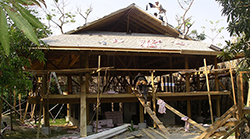Productive forests, sustainable supply chains can be cornerstone for tackling climate change
17 November 2017

The use of sustainably produced wood in long-term products, such as in this house in Honduras, is a way of storing carbon and substituting for other non-renewable building materials, while generating green jobs. Photo: G. Dieterle/ITTO
Dr Dieterle referred to new scientific findings indicating that forest degradation in the tropics has been vastly underestimated and is contributing a much higher share of carbon dioxide emissions than previously assumed. This “alarming new development”, said Dr Dieterle, “requires urgent attention to realize the potential of tropical forests as a major pillar in international climate mitigation and adaptation efforts”.
Moreover, said Dr Dieterle, population growth means ever-increasing demand for timber and forest products, which must be produced sustainably to avoid further forest degradation that would undermine efforts to combat climate change.
“We need to look at forest products the same way we look at food: there is no alternative to producing and using them,” said Dr Dieterle. He emphasized that if rapidly increasing demand for forest products is not met in legal and sustainable ways, the outcome would be more deforestation and forest degradation or substitution with non-renewable alternatives, both of which “have the potential to strongly undermine current efforts to fight climate change and promote sustainable development”.
Dr Dieterle stressed that combining production and conservation efforts is the way forward proposing the following five steps for making productive forests, forested landscapes and associated value chains an integral part of the global forest climate and development agenda and for closing the gap between sustainable wood supply and demand:
- Protect essential high-biodiversity and protection forests for national and global public good purposes.
- Restore degraded multipurpose forest landscapes for productive uses and economically viable benefits.
- Improve the adaptive capacity of tropical forests to make them resilient to climate change.
- Manage and use existing forests sustainably and more efficiently.
- Promote green, degradation-free supply chains and trade.
Dr Dieterle drew the attention of the plenary to the urgent need for smart incentives and finance to build legal and sustainable supply chains and markets for forests products and services. This would be money well spent, he said, because it would help prevent the adverse impacts of climate change while also contributing to green growth, jobs and foreign exchange.
In closing, Dr Dieterle said that ITTO stands ready to help harness the role of productive tropical forests, which could yield substantial substitution benefits that may eventually exceed those of all other forest-related measures combined.
Download Dr Dieterle’s speech below.